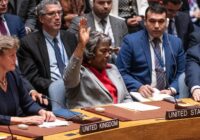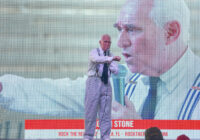A climate of fear is spurring gun purchases in the US and ill-conceived airstrikes by both France and Britain.
Another mass shooting has taken place in America. Last week, this author pointed out how mass shootings have become a way of life in the land of the free and the home of the brave. During that same week, a white Christian fundamentalist killed innocents at a Planned Parenthood clinic because he opposed abortion. This time, a Muslim fundamentalist couple killed 14 people and wounded 21 in San Bernardino, California. Frighteningly, it turns out that they were happily married and had a 6-month-old baby.
The Federal Bureau of Investigation (FBI) is treating the San Bernardino attack as a terrorism case. Syed Rizwan Farook and Tashfeen Malik were of Pakistani origin and had spent time in Saudi Arabia. Farook had grown up in the American Midwest and apparently turned radical after marriage. The couple were making bombs, stashing weapons and planning a massacre for a while. On Facebook, Malik posted her allegiance to the Islamic State (IS) around the time she and her husband began the massacre.
Predictably, Republicans and Democrats differed as to the cause and response to the shooting. Vox points out how Republicans changed from pious men offering prayers for victims to declaring war in a must-win “clash of civilizations.” For Republicans, more guns are the way forward. If people had their own guns, as in the days of the Wild West, they would be able to shoot down the bad guys. Ted Cruz, a Tea Party darling, thundered, “We don’t stop the bad guys by taking away our guns, we stop the bad guys by using our guns.”
President Barack Obama disagrees. He points out that “people on the no-fly list can walk into a store and buy a gun.” He rightly called this insane and declared, “If you’re too dangerous to board a plane, you’re too dangerous, by definition, to buy a gun.”
The Editorial Board of The New York Times, the newspaper of record in the US, brought out a front page editorial for the first time since 1920 to ask for a drastic reduction in the number of firearms. Even as it appealed to the nation’s “sense of decency,” Americans were “stocking up on guns and ammunition, bringing weapons into their daily routines and requesting refresher courses from firing ranges.” It is no surprise that less than 5% of the global population own more than 42% of the world’s privately held firearms. Mass shootings make the news, but suicide is the bigger problem.
A climate of fear is taking root in the US. Americans are easily spooked. Insulated from the Old World by two oceans, they are spoiled and soft. Unlike Europe, Asia, Africa and even Latin America, the US has avoided war on its soil since 1865, when its bloody civil war finally came to a close. The historic attack on Pearl Harbor does not really count because it happened a long way off. In truth, 9/11 was the first real attack on the US mainland since the British burnt the White House in 1814, a year before they defeated Napoleon at Waterloo.
The US reaction after the al-Qaeda attacks was one of panic. George W. Bush, a draft dodger who avoided combat in Vietnam, did not understand war. He reacted emotionally and led the US into Afghanistan for revenge and then into Iraq, which he had no reason to attack. It is interesting to note that Bush’s father, who fought in World War II, was not so gung ho about the war. George H.W. Bush had misgivings about his son’s rhetoric, “iron-ass” Dick Cheney and “arrogant” Donald Rumsfeld. They have proven to be right.
Retired Lieutenant General Michael Flynn, the former director of Defense Intelligence Agency, is more candid about where the US went wrong. In a recent interview with Der Spiegel, he has called the Iraq War a “huge error.” He also points out that “instead of asking why they attacked us, we asked where they came from. Then we strategically marched in the wrong direction.” Blunders by the US prepared the ground for civil war in Iraq and the takeover by IS.
Under Obama, the US is trying hard not to get into another morass. In contrast, Europe is reacting far more skittishly after the Paris attacks. French President François Hollande has declared war on the Islamic State, failing to realize the implications of conducting airstrikes in conjunction with the Russians. This pudgy mediocrity is plummeting in popularity and heading to electoral guillotine. In the last throw of the dice, he is trying to act Napoleonic in his foreign policy with the same stupidity that earlier French leaders demonstrated in Algeria and Vietnam.
British Prime Minister David Cameron has joined Hollande in supposedly taking the war to IS. He believes that “the risks of inaction are greater than the risks of taking action” and airstrikes will degrade IS over time. Cameron, who has a reputation for superciliousness and mendaciousness, called opponents of airstrikes “terrorist sympathizers.” Just as Tony Blair came up with fictional weapons of mass destruction, Cameron has magically conjured up 70,000 moderate Syrian forces raring to have a go at IS. Clearly, Cameron did not get Obama’s memo when he stopped training Syrian rebels.
Both Hollande and Cameron, an Old Etonian and an énarque, have a flawed understanding of terrorism, the Islamic State and indeed the Middle East. The Sykes-Picot world is dead. Both Iraq and Syria are merely de jure states that are fast disintegrating. Airstrikes will only kill a few IS fighters and some innocents. Military action can defeat an organization like IS, but achieving security requires some solution to the social, political and economic dislocation millions are experiencing on a daily basis.
 Neither Hollande nor Cameron can do much in the Middle East. Obama still retains the key man for the region, but his hands are tied. Many Iraqis believe that the US is in cahoots with the Islamic State. It is no surprise that Iraqi Prime Minister Haidar al-Abadi, an ally of the US, shot down Defense Secretary Ashton Carter’s idea of an American expeditionary force based in Iraq. These American troops would have targeted IS, but now they find themselves unwelcome in the very country where they ran the show like cowboys.
Neither Hollande nor Cameron can do much in the Middle East. Obama still retains the key man for the region, but his hands are tied. Many Iraqis believe that the US is in cahoots with the Islamic State. It is no surprise that Iraqi Prime Minister Haidar al-Abadi, an ally of the US, shot down Defense Secretary Ashton Carter’s idea of an American expeditionary force based in Iraq. These American troops would have targeted IS, but now they find themselves unwelcome in the very country where they ran the show like cowboys.
Even as the discourse on terror heats up, so does the planet. The 21st session of the Conference of the Parties (COP 21) has begun in Paris. Simultaneously, southeastern India and northern Britain are experiencing massive floods. Tamil Nadu, the Indian state experiencing the floods, is in disarray. Flood waters and sewage have submerged the city of Chennai that faces risks of epidemics as waters recede. The Hindu, an iconic newspaper of the country, was not published for the first time since 1878. As this author pointed out last week, such floods and extreme weather conditions are now commonplace. This trend portends environmental disaster, economic catastrophe and much human suffering.
Terrorism is piffle when compared to climate change. Unprecedented weather conditions are wreaking havoc. If we fail to act, climate change will create a climate of fear far worse than the Islamic State.
*[You can receive “The World This Week” directly in your inbox by subscribing to our mailing list. Simply visit Fair Observer and enter your email address in the space provided. Meanwhile, please find below five of our finest articles for the week.]
Climate Change: A Clear and Present Danger
Climate change is heating the planet, endangering the lives of billions of human beings and threatening the survival of other species.
Most dictionaries define climate as the generally prevailing weather conditions of a region—as temperature, air pressure, humidity, precipitation, sunshine, cloudiness and winds—averaged over a series of years.
Over the course of time, many species have gone extinct, new ones have evolved and climate has changed. Today, climate change is being caused not by a volcano or an asteroid, but by human beings.
Climate is complex. There are far too many variables involved. Some of these variables are infernally hard to measure. Some still argue that we do not know enough about the causes of climate change. Yet even most of them agree that climate change is real.
For a start, 2015 is the hottest year since 1880. Cities like Hong Kong, Madrid and Sao Paulo recorded new highs this year. In India, well over 2,000 people died in an unrelenting heatwave. Over 100 people lost their lives… Read more
The Dangers of American Education
Why does the US base its national narratives on myth rather than history?
Lately, some Americans have called the world’s attention, yet again, to our society’s shocking and relentless insistence on ahistoricism. Xenophobic, fear-mongering responses to the global refugee crisis from Republicans highlight their refusal to acknowledge America’s role in the crises that drive people to our shores, as well as their forgetfulness about their own backgrounds. After all, most white Americans are descendants of Europe’s underclass, who arrived in this country as immigrants themselves—poor, battered and beaten, and looking for a better life. My own parents like to remind me that we come from a “long line of Norwegian peasants.”
Watching our “leadership” respond to contemporary crises as though they emerged out of nowhere, free of historical roots that we might share responsibility for, is endlessly frustrating. But it is certainly not new. It is part of a deeply disturbing pattern of Americans disregarding history in favor of national mythology. Last week’s celebrations of Thanksgiving offered as good of an opportunity… Read more
White Terrorism Falsehoods of Planned Parenthood Attacks
The attack on Planned Parenthood was an act of terrorism by a coward who didn’t have the confidence or integrity to use speech.
It’s bleak out there for the right-wing in America. The Paris climate conference is yielding scathing testimonies on our future of a scorched Earth. What may be the largest cover-up over the police shooting of a black teenager has recently come to light. Students are questioning the names of college buildings, and five demonstrators were shot at the #BlackLivesMatter protest, possibly with police complicity.
Then came a gruesome attack at a Planned Parenthood clinic, the sixth in four months. On November 27, three individuals, including a policeman, were shot and killed at the Colorado Springs Planned Parenthood and nine others were injured. The prime suspect, 57-year-old white man called Robert Dear, represents a new white poster boy for violent and scary behavior. This is particularly awkward for the right for two reasons. First, the Republicans have been whipping up anti-refugee hysteria by stoking fears of terrorism… Read more
Is Europe’s Buffer Zone in Ukraine Keeping it Safe?
Ukraine must protect civilian populations in the Donbas region and seek a political solution to the conflict.
European and American foreign policy elites have come to regard the brutal war in eastern Ukraine almost entirely through the lens of geopolitics. The terrible human suffering of the war remains an unfocused foreground that they gaze through at a “resurgent Russia,” “Europe in the balance,” “challenges to world order.”
The distorting effect of this distance became visible to the authors of this article, one of whom spent September 25 rubbing elbows with policymakers at the congressional forum, and the other as the guest of a young Ukrainian family on the frontlines of this conflict.
The forum brought together prominent Ukrainian, European and American politicians and activists to advocate for humanitarian, economic and “yes, military aid” as Ukraine gradually recedes from the headlines. But they were matched by numerous speakers who called for a reignition of the very conflict that has brought that crisis on. They stated that Ukrainians must be armed for… Read more
Academic Freedom in India is Nonexistent
Universities are meant to promote public good through teaching and research—they must be protected from party politics.
Ever since the Bharatiya Janata Party (BJP) rode to power in 2014, there has been growing unease within India’s academic community, where the last vestiges of the Nehru dynasty are alive and kicking. The sense of frustration with the new government has only heightened with a series of controversial appointments to some of India’s finest universities and academic institutions. If one scrutinizes the political and ideological backgrounds of these men, they cannot help but notice that the new government has started to refashion the country’s intellectual discourse—discourse that has marginalized those who find themselves on wrong side of the ruling establishment.
These appointees are men whose only merit lies in their ideological proximity to Prime Minister Narendra Modi. Some of them even publicly declared their allegiance to Modi or the BJP well before the 2014 general election, praising him in their writings and speeches. So, it should come as no surprise that… Read more
The views expressed in this article are the author’s own and do not necessarily reflect Fair Observer’s editorial policy.
Photo Credit: Paul Matthew Photography / Shutterstock.com
 We bring you perspectives from around the world. Help us to inform and educate. Your donation is tax-deductible. Join over 400 people to become a donor or you could choose to be a sponsor.
We bring you perspectives from around the world. Help us to inform and educate. Your donation is tax-deductible. Join over 400 people to become a donor or you could choose to be a sponsor.
Support Fair Observer
We rely on your support for our independence, diversity and quality.
For more than 10 years, Fair Observer has been free, fair and independent. No billionaire owns us, no advertisers control us. We are a reader-supported nonprofit. Unlike many other publications, we keep our content free for readers regardless of where they live or whether they can afford to pay. We have no paywalls and no ads.
In the post-truth era of fake news, echo chambers and filter bubbles, we publish a plurality of perspectives from around the world. Anyone can publish with us, but everyone goes through a rigorous editorial process. So, you get fact-checked, well-reasoned content instead of noise.
We publish 2,500+ voices from 90+ countries. We also conduct education and training programs
on subjects ranging from digital media and journalism to writing and critical thinking. This
doesn’t come cheap. Servers, editors, trainers and web developers cost
money.
Please consider supporting us on a regular basis as a recurring donor or a
sustaining member.
Will you support FO’s journalism?
We rely on your support for our independence, diversity and quality.











